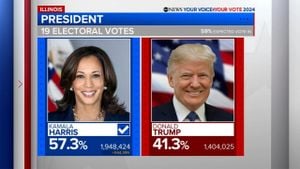Recent political skirmishes highlight the shifting dynamics within American politics, particularly concerning transgender representation and rights, as exemplified by Congresswoman Sarah McBride's recent confrontations with Republican representatives Nancy Mace and Marjorie Taylor Greene. McBride, who made history as the first openly transgender person elected to the U.S. Congress, has found herself at the center of controversy following Mace's proposal of legislation targeting transgender individuals' use of public restrooms. This measure has stirred widespread criticism and raised questions about the motivations behind such political maneuvers.
The backdrop to McBride's rise is significant; her election marked progress for representation at the federal level, which many advocates had long championed. She entered Congress with hopes of advocating for policies affecting not only the LGBTQ+ community but also addressing broader economic and social issues—strikingly relevant amid the turmoil surrounding the upcoming 2024 elections.
Just as McBride was gearing up to take her seat, Mace introduced legislation aimed directly at her, asserting it was necessary to protect women’s spaces. This assertive stance, ironically juxtaposed against her previous claims of being ‘pro-transgender rights,’ epitomizes the duplicity often seen within contemporary politics. Mace had previously described herself as supportive of LGBTQ rights, declaring on CBS News, "I'm pro-transgender rights. I'm pro-LGBTQ. Just don’t go to the extreme with our kids.” The sudden reversal raises doubts about the sincerity of her prior statements.
This apparent contradiction can be disheartening not just for McBride but for many constituents who view such actions as harmful, reducing complex identities to mere political objects. Supporters of McBride, and advocates for LGBTQ rights more broadly, argue these provocative legislative proposals are distractions from pressing issues like healthcare and economic stability, and serve to perilously politicize personal and private matters.
The wider implication of Mace's actions goes beyond McBride. This episode serves as a reflection of how many politicians may weaponize identity politics, particularly targeting marginalized groups to rally their base, often employing inflammatory rhetoric aimed at eliciting fear and securing political advantage. Greene’s extreme rhetoric, including veiled threats of violence against McBride if she were seen using women’s facilities, exemplifies the aggressive tactics deployed by some on the far-right.
Simultaneously, the silence from other Republicans, who are often quick to speak on various issues, has been notable. Some argue their inaction constitutes tacit approval of Mace and Greene's anti-transgender campaign. The lack of challenge to such hostile actions creates an environment where negativity, rather than constructive discourse, is dominating the narrative.
McBride herself has voiced her disappointment, stating, “This is a blatant attempt from far-right extremists to distract from the fact they have no real solutions to what Americans are facing.” Her observation speaks volumes, drawing attention to the superficial political gamesmanship sometimes observed within Congress, especially from groups aiming to undermine progressive movements under the guise of protecting traditional values.
Also problematic is the portrayal of transgender individuals, reinforced by statements from Mace, which inaccurately depict gender-affirming medical treatments as dangerous or misguided. Medical organizations, including the American Medical Association and the World Health Organization, assert the necessity of gender-affirming care. Mace's statements mischaracterize factual medical practices, aiming to distort public perception and rally support against McBride.
Individuals like Greene and Mace may find some temporary success in sensationalism, but critiques of their tactics have grown louder. Observers note the stark double standard at play; many Republicans have positioned themselves as defenders of traditional values, yet their actions often conflict with the essence of those values—respect and dignity for individuals.
The 2024 elections loom large on the horizon, with many viewing these confrontations as potential red herrings. Voters remain focused on substantive issues like economic policy and health care reform rather than divisive culture wars. McBride’s fight is emblematic of the broader struggles faced by minorities within current political discourse—as they confront not only the challenges of legislative opposition but also societal prejudice amplified by political rhetoric.
Moving forward, the stakes are clear. The situation calls for allies willing to advocate for the rights of all individuals and challenge harmful politics. McBride’s presence within Congress is pivotal, both as representation for transgender people and as indicative of the changing tides within the political arena. With allies stepping up and advocating for constructive discussions over inflammatory tactics, there may yet be space for meaningful change.
This clash over bathroom usage does more than spotlight the upheaval surrounding trans rights; it serves as a narrative for the ideological battles playing out across the nation. Inclusion versus exclusion, progress versus stagnation—these are the themes underscoring much of today's political discourse. McBride’s determination to champion equality, even amid prevalent attacks, marks her tenure as not only one of struggle but one of potential transformative change within U.S. politics.



